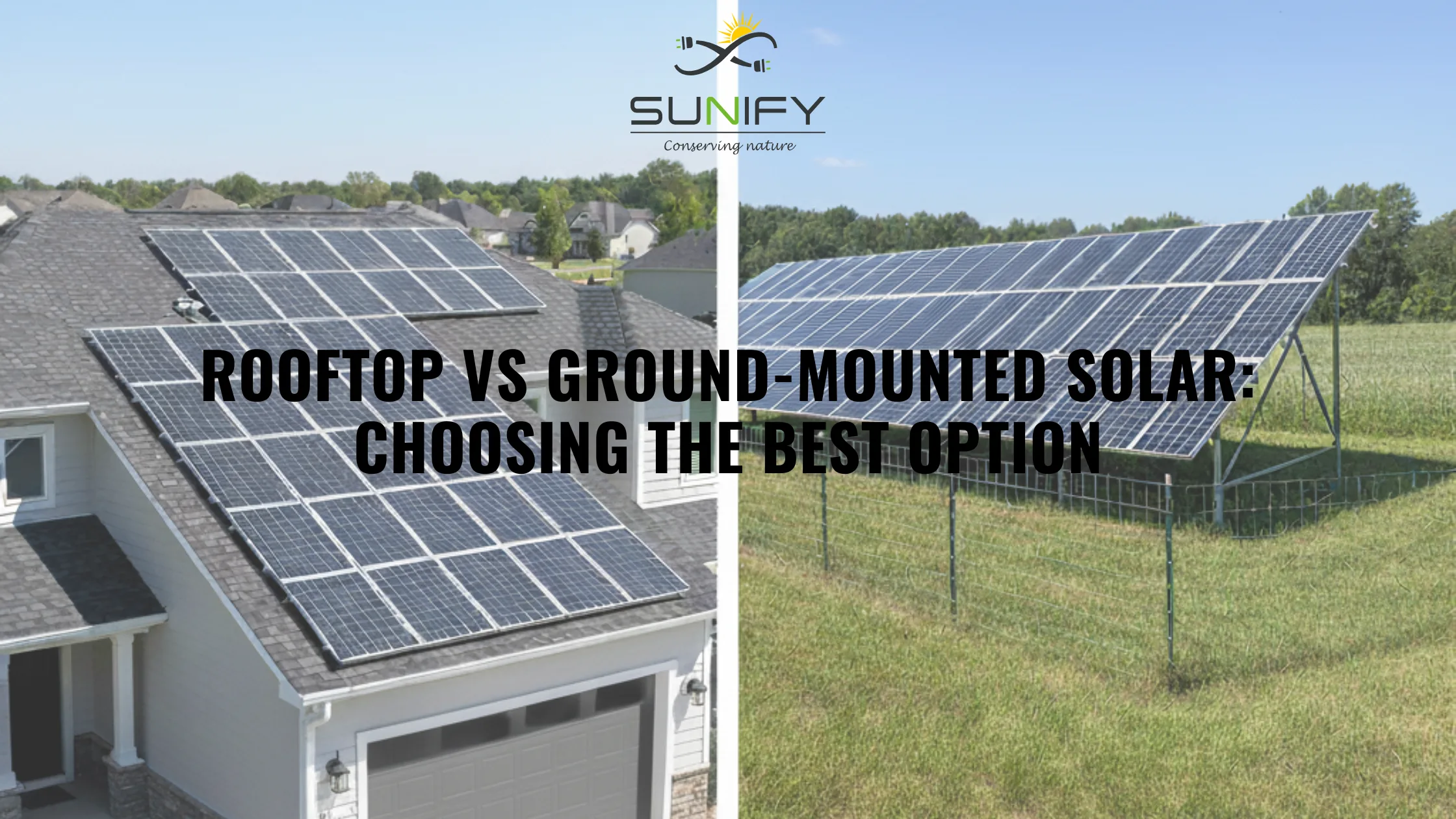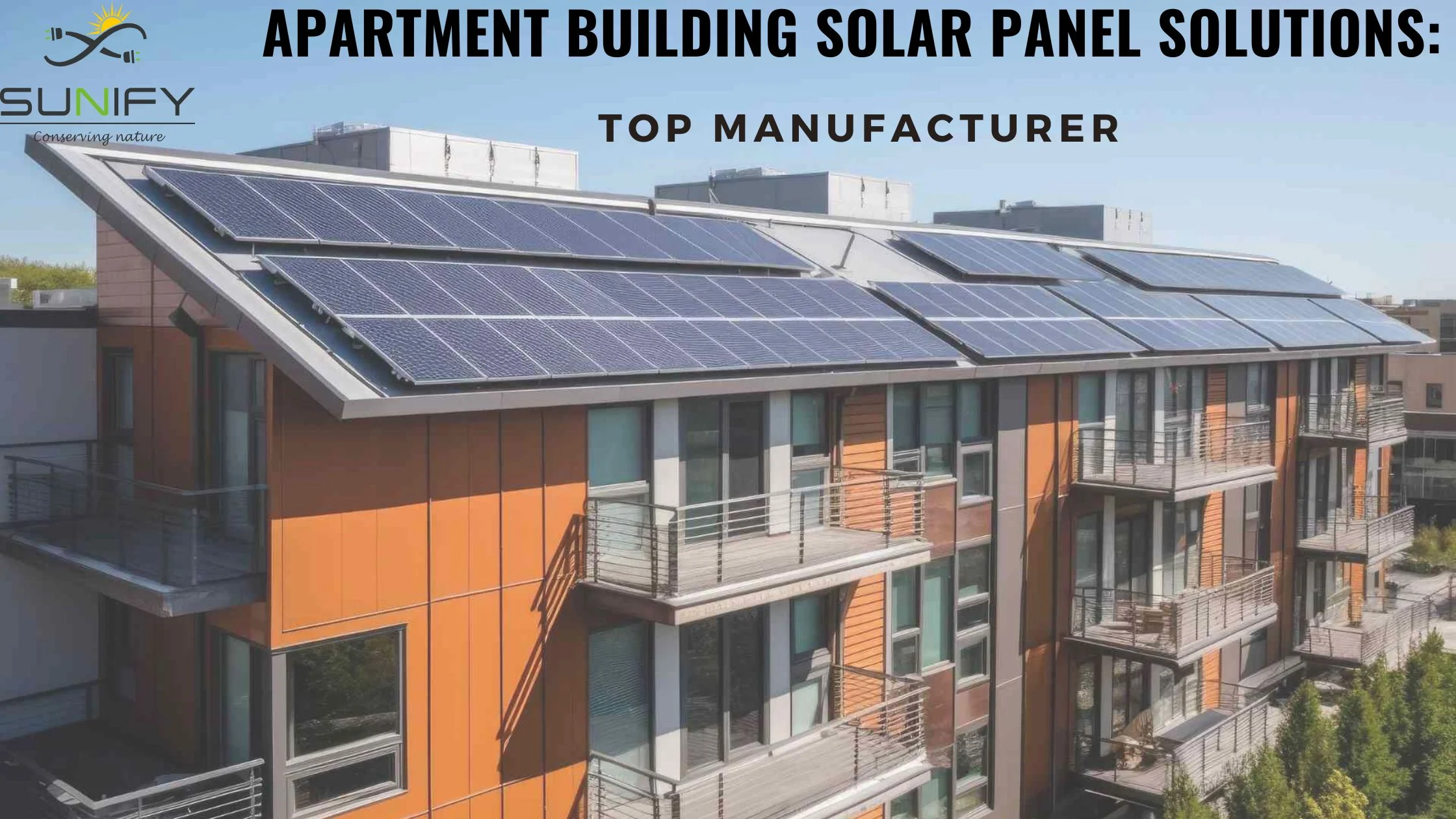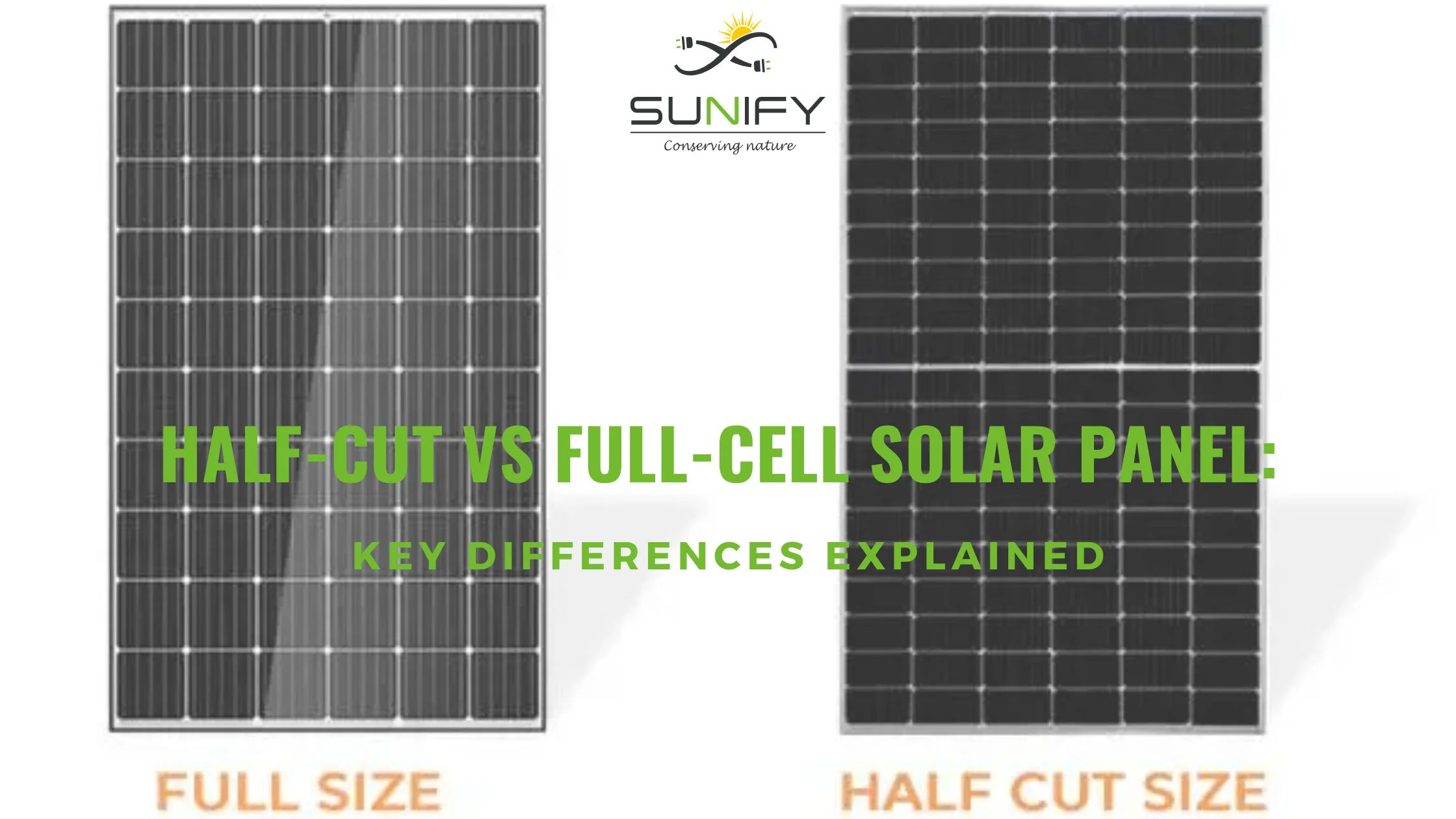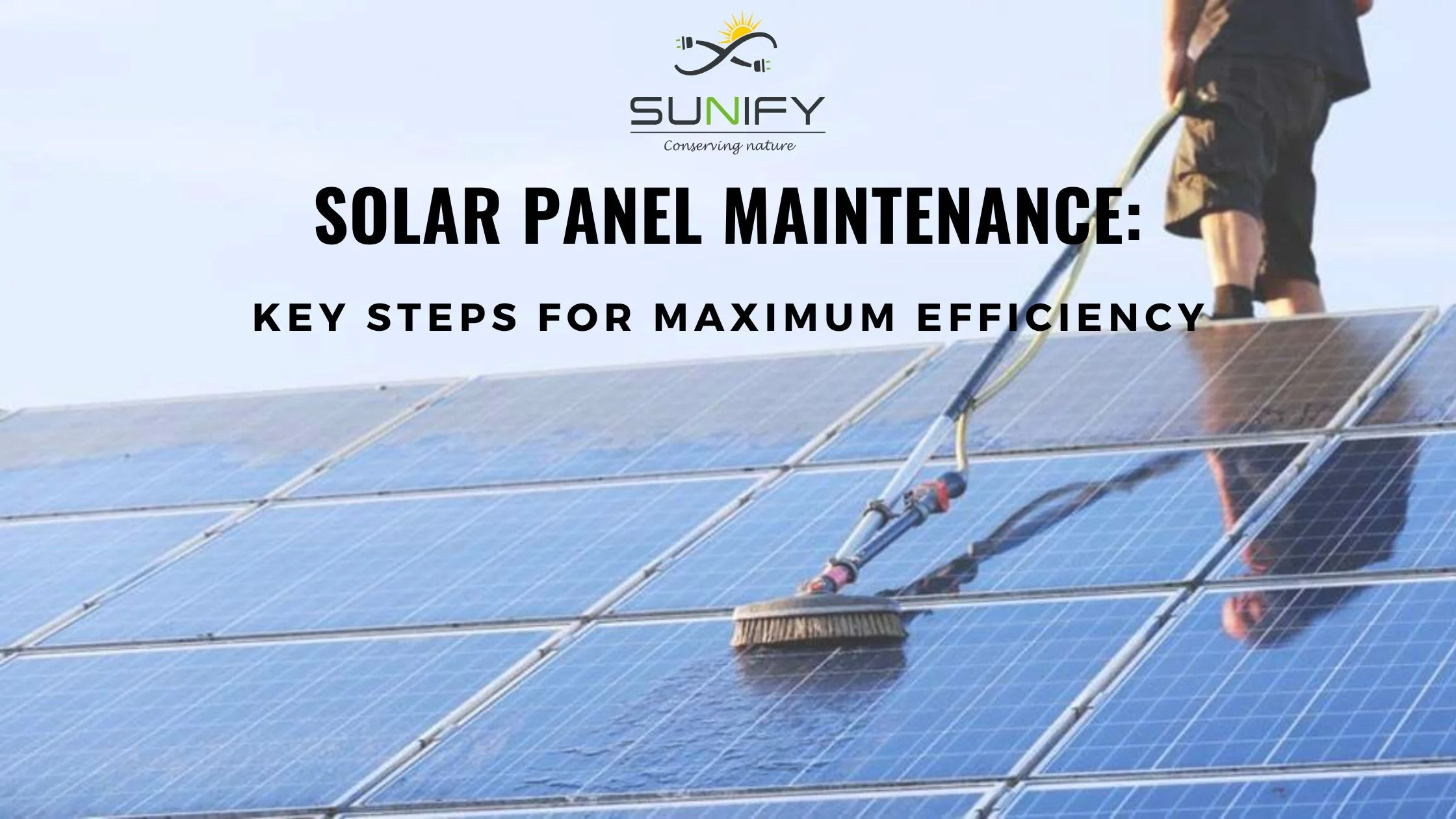
Connect With Our Team
As renewable energy adoption accelerates worldwide, more homeowners and businesses are realizing the long-term benefits of switching to solar energy. However, when planning a solar installation, one major decision remains: should you go for rooftop solar or ground-mounted solar? Both systems convert sunlight into electricity efficiently but differ in setup, performance, cost, and practicality. Knowing the pros and cons of each can help you choose the most suitable option for your property and energy goals.
What is Rooftop Solar?
Rooftop solar systems are installed directly on top of residential, commercial, or industrial buildings. The roof solar panels absorb sunlight and generate electricity to power the premises or feed excess energy back to the grid. This type of installation is ideal for areas with limited open land but adequate roof space, such as urban homes and offices.
Modern technologies have also evolved to include in-roof solar panels and solar roofs, which integrate the panels seamlessly into the roofing structure. This provides both a clean aesthetic and efficient energy production. Homeowners looking to install solar panels for my roof can choose from various types based on roof orientation, slope, and design. Additionally, if you are building a new roof with solar panels, it allows you to integrate energy generation right from construction, reducing installation costs and improving long-term efficiency.
What is Ground-Mounted Solar?
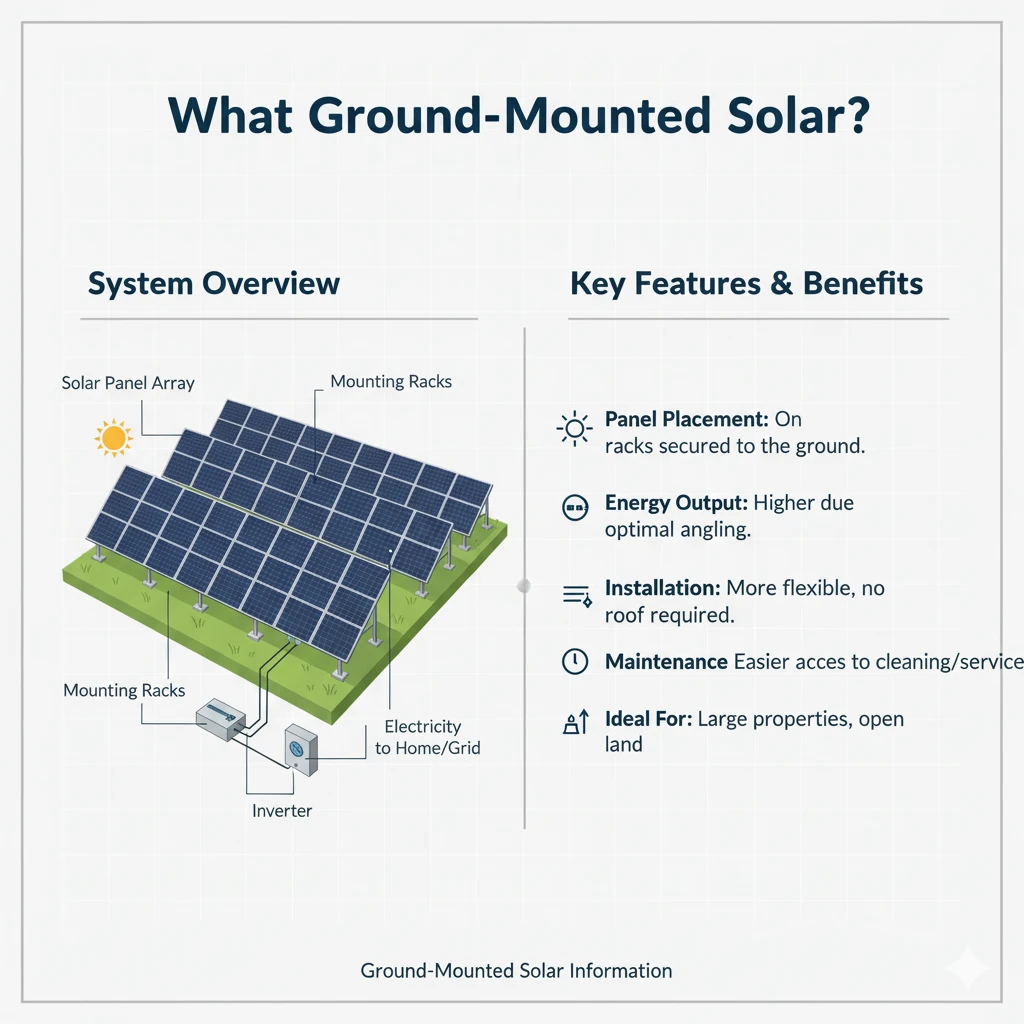
Ground-mounted solar systems are installed directly on the ground using mounting structures or frames. They are perfect for properties with large, open spaces such as farms, industrial zones, or institutions. Since ground-mounted solar panels are not restricted by roof shape or direction, they can be placed at the optimal tilt and orientation to capture the maximum amount of sunlight throughout the day.
This flexibility often results in higher performance and energy generation. Additionally, ground-based solar panels are easier to clean, maintain, and expand. Whether for residential use on a large plot or for a commercial ground mount solar system, they are highly efficient and scalable options for users with higher power demands and available land.
Key Differences Between Rooftop and Ground-Mounted Solar Systems
| Parameter | Rooftop Solar | Ground-Mounted Solar |
|---|---|---|
| Installation Area | Utilizes unused roof space | Requires dedicated land area |
| Flexibility | Limited by roof shape, direction, and size | Panels can be adjusted for maximum sunlight |
| Maintenance | Harder to access for cleaning | Easier access for maintenance |
| Cost | Lower installation cost | Slightly higher due to land preparation |
| Energy Output | Depends on roof orientation | Can be optimized for higher efficiency |
| Scalability | Restricted to roof area | Easily expandable for future demand |
| Ideal Use | Homes, small offices | Farms, factories, institutions |
Both roof and solar panel installation and ground solar panels have unique benefits depending on your energy needs and site conditions.
Which is More Efficient: Rooftop Solar or Ground-Mounted Solar?
In terms of performance, ground-mounted solar systems tend to be more efficient due to their flexibility in positioning. Installers can adjust the tilt and direction of panels based on the site’s latitude and sunlight exposure. Ground systems also stay cooler due to better air circulation, which enhances performance since high temperatures can reduce panel efficiency.
However, the best roof solar panels, when installed on south-facing rooftops with minimal shading, can deliver nearly the same efficiency levels. For most residential settings, rooftop solar power remains the most practical and affordable way to achieve energy savings and sustainability without additional land requirements.
Installation Requirements and Considerations
Installing solar panels on roof requires careful structural assessment. The roof should be strong enough to support the weight of panels and withstand wind loads. Additionally, the roof material (metal, concrete, tile, etc.) and orientation (south-facing roofs perform best in India) influence the system’s energy yield.
On the other hand, installing a ground mount solar system involves site preparation, racking installation, and sometimes trenching to connect to the grid. While initial costs are slightly higher, these systems offer greater design flexibility and long-term efficiency. Properties with shaded or irregularly shaped roofs often prefer this setup to ensure maximum sunlight capture.
Cost Comparison: Rooftop vs Ground-Mounted Solar
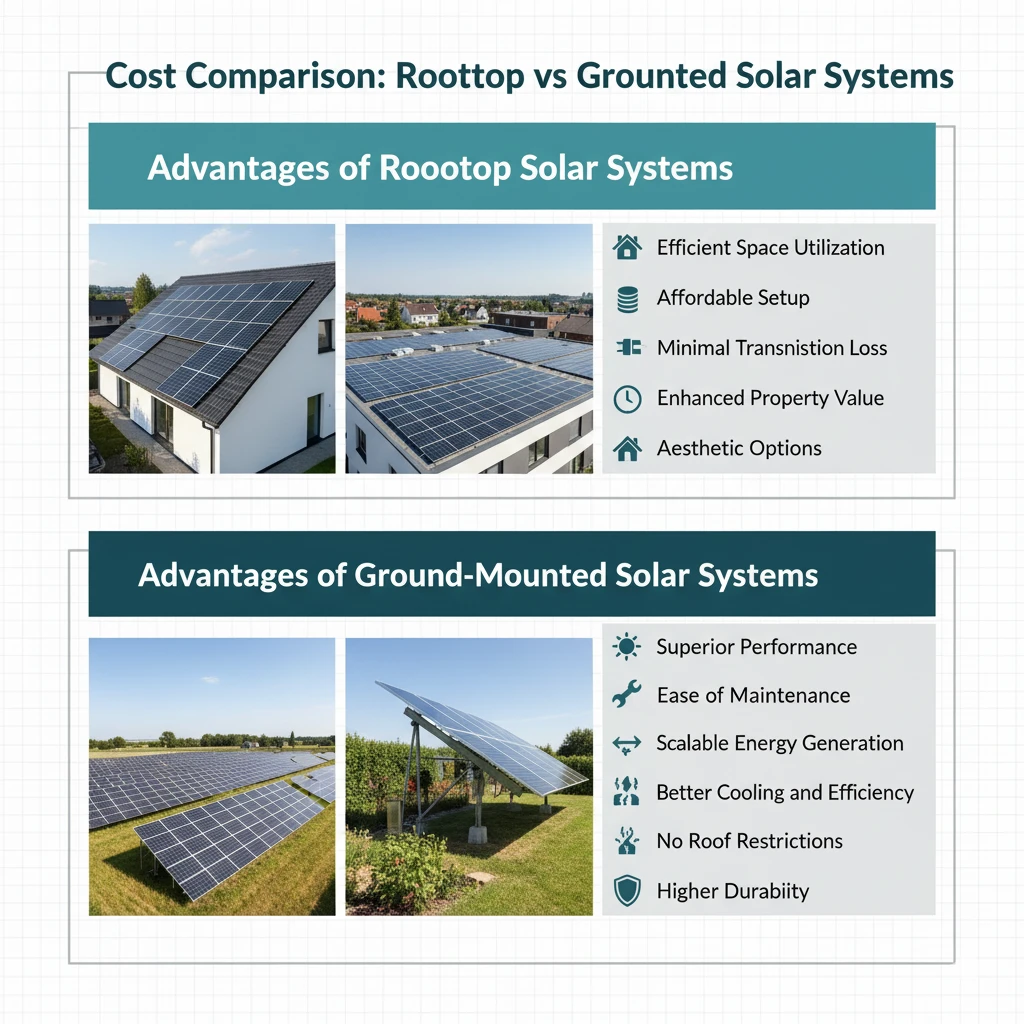
Roof top solar systems are generally more affordable because they use existing structures and require minimal site preparation. They are ideal for small and medium power requirements. In contrast, ground-mounted solar systems have higher upfront costs due to land usage and structural supports but offer better performance and easier scalability.
Over the long term, the return on investment (ROI) for ground-mounted systems can be higher, particularly for businesses or industries with large power consumption. Both systems, however, qualify for government subsidies and tax benefits in India, making them attractive long-term investments in renewable energy.
Advantages of Rooftop Solar Systems
-
Efficient Space Utilization: Makes use of underutilized roof areas, reducing the need for extra land.
-
Affordable Setup: Lower installation cost compared to ground systems.
-
Minimal Transmission Loss: Energy is generated and consumed within the same building.
-
Quick Installation: Easier and faster setup process.
-
Enhanced Property Value: Buildings with solar installations have higher resale value and appeal.
-
Aesthetic Options: In-roof solar panels and solar roofs offer modern, sleek designs suitable for contemporary architecture.
Advantages of Ground-Mounted Solar Systems
-
Superior Performance: Optimal tilt and orientation increase energy production.
-
Ease of Maintenance: Panels are easily accessible for cleaning and repair.
-
Scalable Energy Generation: Ideal for future expansion or large-scale commercial use.
-
Better Cooling and Efficiency: Natural airflow around panels prevents overheating.
-
No Roof Restrictions: Perfect solution for shaded or weak roofs that cannot support solar weight.
-
Higher Durability: Strong foundation and adjustable racks ensure stability even in harsh weather.
Which Option is Better for Commercial Use?
For industries and large businesses, the choice depends on space availability and energy requirements. Commercial rooftop solar systems are efficient for buildings with wide, flat roofs and low shading. They help reduce electricity bills, support corporate sustainability goals, and enhance brand reputation.
However, for large factories, warehouses, or institutions that consume significant power, ground-mounted solar panels offer a more scalable and high-yield solution. They can generate more energy and allow expansion as power needs grow, making them ideal for long-term commercial operations.
How to Choose the Right Solar System for Your Property
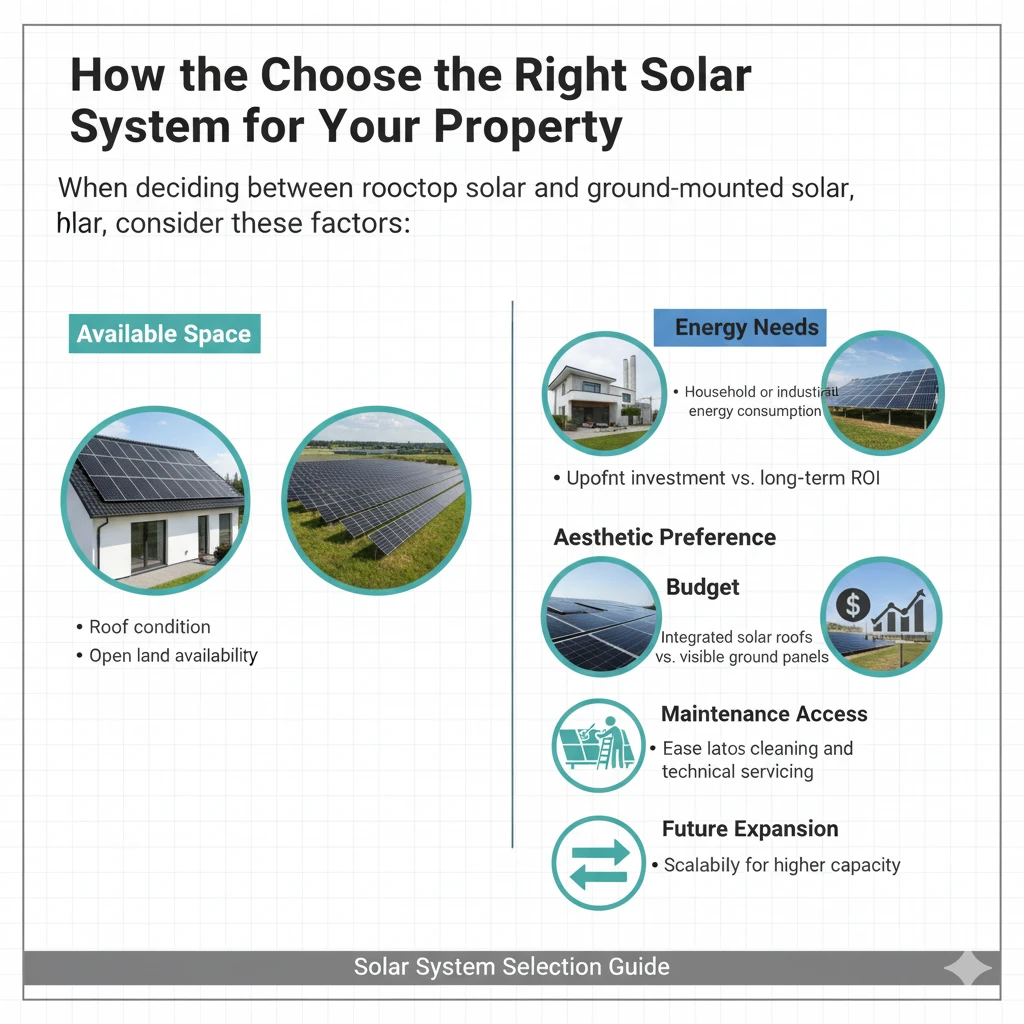
When deciding between rooftop solar and ground-mounted solar, consider these factors:
-
Available Space: Roof condition and open land availability.
-
Energy Needs: Household or industrial energy consumption.
-
Budget: Upfront investment versus long-term ROI.
-
Aesthetic Preference: Whether you prefer integrated solar roofs or visible ground panels.
-
Maintenance Access: Ease of cleaning and technical servicing.
-
Future Expansion: Scalability for higher capacity in the future.
Consulting with an experienced solar panel manufacturer and installer ensures a detailed site evaluation, accurate energy forecasting, and tailored recommendations.
Sunify Solar – Empowering Homes and Businesses with Smart Energy Solutions
Sunify Solar, a leading solar panel manufacturer and supplier in India, offers high-performance solutions for both rooftop solar and ground-mounted solar systems. With advanced technology, durable materials, and efficient installation services, Sunify Solar ensures maximum power output and long-term reliability. The company provides end-to-end solar solutions, including design, installation, maintenance, and after-sales support, helping residential, commercial, and industrial clients transition to clean, renewable energy with ease.
Sunify Solar manufactures and supplies a wide range of high-efficiency solar panels, including monofacial and bifacial modules. Monofacial solar panels capture sunlight from one side and are ideal for residential rooftops, offering excellent energy generation in compact spaces. Meanwhile, bifacial solar panels absorb sunlight from both sides, significantly increasing energy output, making them perfect for ground mount solar systems and large-scale commercial installations.
Whether you want to install solar panels for house roof or build a ground-mounted solar plant for industrial-scale energy production, Sunify Solar guarantees superior quality, high energy efficiency, and long-term sustainability, making solar energy an affordable, future-ready, and dependable choice for everyone.
Explore Solar Installation Types
Conclusion
Choosing between rooftop solar and ground-mounted solar depends on your space, budget, and energy requirements. Rooftop systems are best suited for residential properties and small businesses seeking an affordable way to go green, while ground-mounted setups are ideal for commercial or industrial users with ample land and higher power needs.
In both cases, investing in solar energy not only reduces electricity costs but also contributes to a cleaner, more sustainable planet. Partnering with trusted providers like Sunify Solar ensures expert guidance, efficient installation, and reliable energy generation for years to come.
Recently Posted
Whatsapp Chatx
Hi! Click one of our representatives below to chat on WhatsApp or send us email to solar@sunifysolar.in

|
************** +91 81414 55503 |

We will love to hear from you!


